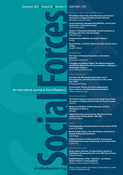-
Views
-
Cite
Cite
Randolph Hohle, The Scramble for Citizens: Dual Nationality and State Competition for Immigrants By David Cook-Martin Stanford University Press. 2013. 216 pages. $45 cloth, Social Forces, Volume 94, Issue 2, December 2015, Page e34, https://doi.org/10.1093/sf/sot106
Close - Share Icon Share
Extract
Zygmunt Bauman argued that the era of contemporary globalization has polarized a super elite with the freedom of mobility from impoverished localities that have been “stripped of social meaning.” As David Cook-Martin shows in The Scramble for Citizens, it turns out that freedom of movement between states is no longer the exclusive property of global elites. Rather than a world of the one-percenters moving freely about nation-states, Cook-Martin tells the story of the increasing mobile Argentine middle class and those on the margins of society—immobile and left behind with a devalued citizenship.
Drawing from both comparative historical and ethnographic methods, Cook-Martin advances a political field approach to understand existing citizenship and immigration policy. He shows that Italy, Spain, and Argentina made immigration policy in relation to changes in the global economy and in anticipation of each other's immigration policies. Analyzing a political field basically means that a structured relationship forms around relations between competing and sometimes cooperating actors, whose relative influence in the field is determined by the actor's position relative to the position of other actors. The position in the field shapes everything from influence to strategy. However, many scholars use the language of fields to simply describe conflicts or political struggles. Cook-Martin avoids this conceptual pitfall and makes an empirical contribution to how inter-state relations rather than national laws define immigration policy. In the early twentieth century, when Argentina's economy was growing, political elites recruited Spanish and Italian citizens to immigrate to Argentina. In order to make the newly arrived immigrants Argentine, Argentina adopted jus soli citizenship (citizenship based on where you were born) that automatically gave the children of immigrants Argentine citizenship. In relation to Argentina's move, Spain and Italy defined citizenship as jus sanguinis, or simply, family lineage. As the economic fortunes of Argentina and the Euro-zone flipped, the jus sanguinis citizenship opened up a process of Argentines with Italian descent seeking plural citizenship with Italy, and Argentines with Spanish descent seeking citizenship with Spain. From my reading, Cook-Martin makes a compelling argument for a political field framework to explain contemporary issues pertaining to immigration and citizenship, including the legal relevance of citizenship and questions of what it means to belong.



